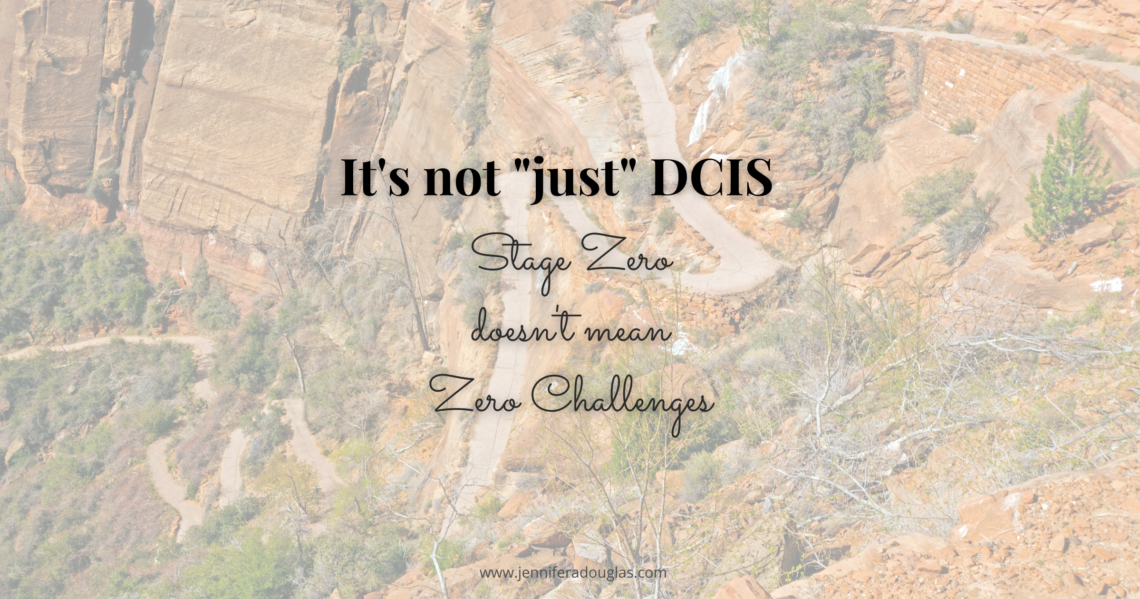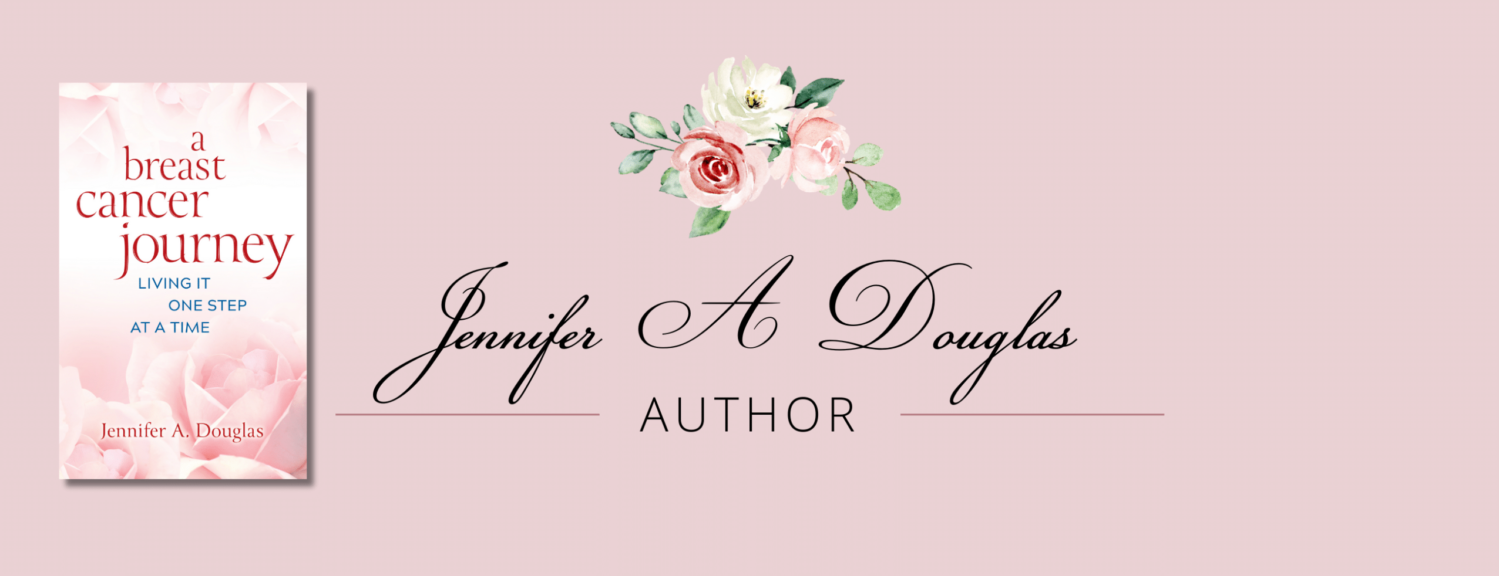
It’s Not “Just” DCIS: Stage Zero doesn’t mean Zero Challenges
It’s’ just DCIS. It’s just Stage Zero. Just stop it! Stage Zero breast cancer doesn’t mean Zero Challenges.
In a recent post, I wrote about the word just and how it should be eliminated from patient communications. The word “Just” minimizes our lived experiences, implies our emotions aren’t valid, and makes it easier for the speaker but harder for the receiver.
I experienced the tension of the word just in my DCIS diagnosis, treatment, and recovery. Often, I talk to other recently diagnosed patients and hear them minimizing their diagnosis to me. Sometimes they’ve had an experience where a doctor says it’s “just” DCIS. Or perhaps a family member shares a story about someone who had a much more advanced case of breast cancer and seemed to be doing much better than them. The unspoken question is, “Why is this such a big deal to you? It’s just DCIS.”
Or is it?
The reality is that spot of non-invasive, stage zero breast cancer means we now must make choices we never wanted to. We are now catapulted headlong into cancer land, and our treatment options look remarkably similar to those diagnosed with other stages of breast cancer. If you’ve ever sat down and sifted through the options for treating breast cancer, I’ll bet you wouldn’t want to order off of the menu.
My Story- When it Stopped Being “just” DCIS
As I was swirling through the emotions of being newly diagnosed in 2019, I remember feeling the need to tamp down on my reactions because it was “only” stage zero. Surely I didn’t need to have these big emotions when my cancer was caught so early. My team had a plan and was confident that we could proceed smoothly to surgery.
And then, my MRI caught more suspicious breast findings.
Suddenly, it all fell apart. Never before had I experienced such peaks of anxiety in my life. Not only did I need to endure more biopsies, but I also needed to delay my surgery. What was even more frightening was the reality that these findings were in my “non-cancer” breast. And one of them was a suspicious-looking lymph node.
Now it didn’t seem like it was “just” DCIS. It wasn’t “just” stage zero.
In those moments, I realized that Stage Zero doesn’t mean Zero Challenges.
Those weeks of delay brought anxiety, fear, worry, anger, and frustration to the forefront of our lives. My kids were worried and anxious. My husband wondered how much more cancer I had and whether he would need to raise the boys without me. My mom, visiting, was bringing visible strength and hope to us while struggling inside that her only daughter was facing cancer.
So, you tell me, was this “just” DCIS?
Our family was not okay. And it didn’t matter at the time how much I trusted my team (which I did) or how non-invasive or small my DCIS was. That 4 millimeters of abnormality had expanded out of my breast and taken over my mind and home. We all had breast cancer on our minds. There was no normal to be found.
The school lessons needed to be done, the baseball practices needed to be attended, the PSAT had to be taken, and all the while, my boys had to think about the fact that mom had cancer, and we didn’t know how bad it was. Since we were schooling at home, they didn’t have a place to go to escape from the swirl for a few hours every day.
As I think back to the challenges they went through, to this day, I get angry. Why did they have to endure this at such a critical part of their lives? Why did this happen to us?
It’s been years now, and I don’t know why.
I never will.
It wasn’t “just” DCIS for us. And if you’re dealing with a diagnosis, it probably isn’t “just” DCIS for you too.
That is why I wrote “A Breast Cancer Journey: Living it One Step at a Time.” Breast cancer is hard, no matter what stage it is discovered at.
Cancer is a Challenging Mountain to Climb
We need to normalize the reality that cancer is hard. Yes, we should get screenings like colonoscopies, skin checks, and mammograms. But nothing can prepare us for the difficulties that occur if the scans find something.
I’ve done a lot of hiking, and one of my least favorite parts about hiking is the switchback trails that are common as we climb a mountain. Back and forth we go, with the incline rising, and we trudge our way uphill. Wouldn’t it be shorter if we walked straight up the mountain? There was no easy way to get to the top, and the switchback trail made it doable but not any less exhausting.
As I think about the diagnosis and treatment pathways we endure during our treatments, I think about the switchback trails heading up a mountain. With every imaging appointment, biopsy, blood test, or pathology report, we climb up the treatment mountain.
Not all of our mountains are equal. But they are all hard.
DCIS treatment is hard. Imaging leads to biopsies, which leads to surgery choices. We may have genetic testing along the way and appointments to plan ways to reduce the risk of DCIS or invasive cancer reappearing in our lifetime. We made decisions about medications to take for several years after active treatment, consider radiation, and maybe endure multiple surgeries to complete reconstruction. And then, we can add in the emotional and mental strain of cancer. It is difficult.
Stage Zero doesn’t mean Zero Challenges.

Your Journey Matters.
Read the book that will help you live your journey one step at a time.
Key information and first-hand information are woven together inside each chapter.
Discover the encouragement you need today!
Stage Zero doesn’t mean Zero Challenges.
Aligning and Educating Us as People and Patients
Many of us land in Cancerville feeling overwhelmed. Before that abnormal imaging, we were going about our lives. And then, all of a sudden, it all changes. Whether that finding is cancer or not, we are still faced with potentially expensive diagnostic imaging and biopsies and live with a new sense of uncertainty.
There is power in aligning with us in those moments of heightened emotion. As I faced surgery to remove an inconclusive finding on my breast in 2022, I had a memorable interaction with my surgeon. He paused for a moment and asked me how I was doing. This question went well beyond facing a lumpectomy (which I’d been through before.). It was a moment of alignment.
We had already discussed the regularity that biopsies come back inconclusive in his practice during our appointment — the educational side of the coin. But this was different. It was a moment of alignment where he acknowledged that the inconclusive nature of the biopsy meant uncertainty, anxiety, and more worry for me.
At that moment, I felt seen and understood.
He aligned with me as a person, and it mattered.
That finding— it was “just” a benign fibroadenoma.
There was no “just” about it. That pesky finding disrupted my summer, increased our out-of-pocket medical costs for the year, reduced my ability to enjoy time with my college son, who was home for the summer, and added another scar to my collection.
There was nothing “just” about that.
Benefits of Aligning and Educating
There is a great benefit to aligning and educating us. It enables us to feel heard as we deal with a diagnosis’s very real mental, emotional, financial, and physical impacts. When we express anxiety or fear, listen and see us. What may be commonplace to order for you may spark intense emotions and challenges for us. Hear us, and educate us on why these next steps are essential. We want to know why we should disrupt our lives and our well-being.
As I was facing another set of three biopsies after my eventful MRI, I asked my surgeon if I could avoid the biopsies altogether and go with a mastectomy. (Did I tell you yet how much I hate biopsies?) He paused, took some time to address my emotions regarding the biopsies, and then went on to educate me about me why these biopsies were necessary. My surgeon needed that pathology from the findings to ensure the treatment was appropriate for my diagnosis. He would be missing critical information if I didn’t go through with them. He assured me that a slight delay in surgery timing was worth it so he could have as much information as possible going into the surgery.
I appreciated the dual focus of his approach. He aligned with me about my feelings regarding the biopsies and then educated me about why they were critical.
So, I went through with the extra three biopsies. I hated them, but I did it. It was not “just” three more biopsies. They were hard, exhausting, and anxiety-provoking and took many hours to travel to and from.
It turns out the findings were benign. Not “just” benign. But benign nonetheless.
Those few weeks, from MRI to biopsy results, were extremely difficult.
Stage zero didn’t mean zero challenges.
A potential or actual cancer diagnosis thrusts us into a world of uncertainty, fear, anxiety, and a swirl of emotions. It is never “just” DCIS or “just” skin cancer. Or “just” a biopsy. In the swirl of diagnosis, it can be hard to focus on the overall final efficacy of treatment. We are coping with so much that it can feel like an unclimbable mountain to reach the end of our treatment. Supporting us can look like aligning and acknowledging our emotions and educating us about why we should keep going.
And above all, don’t minimize us. For us- it isn’t “just” DCIS.
Stage Zero doesn’t mean Zero Challenges.
Jennifer Douglas
Jennifer is the author of "A Breast Cancer Journey: Living it One Step at a Time," breast cancer survivor, and patient advocate. Her book, published in 2023 by Bold Story Press, is an encouraging guide for breast cancer patients. It contains first-hand information, organized by topics, to help readers navigate the diagnosis, treatment, and recovery from breast cancer. Her writing emphasizes emotional, mental, and physical well-being along with empowered decision-making.


You May Also Like

Breast Imaging Focus: What Is A Diagnostic Mammogram?
February 11, 2022
Eighteen-Month Imaging after my Lumpectomy: Bilateral Mammogram with a Surprise Ultrasound
June 27, 2021
